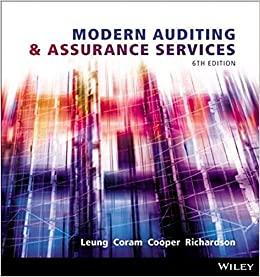You are the external auditor of Kiwi Tours Ltd, a company which promotes New Zealand tours to
Question:
You are the external auditor of Kiwi Tours Ltd, a company which promotes New Zealand tours to Australia and owns a chain of duty-free shops. You have been auditing the company since it was listed on the Australian Securities Exchange 10 years ago. Although the accounts have never been qualified, you are aware that the company has been making losses for the past 3 years as a result of short-term cash flow difficulties. The company has no long-term loans and the bank overdraft is near its limit at the end of the financial year.
During the financial year, the company upgraded its accounting system to a computer database. A consultant was hired to aid in the correct changeover of files for this system. At year-end, this new system had been in place for 6 months, and the directors report they are happy with the way it is operating. You do not have the expertise to review and evaluate the database management system, so you ask an independent expert to undertake this role. This person concludes that the system appears reliable and that the changeover was correctly carried out. You have never before audited this type of system, so you attend some courses to familiarise yourself with its features.
Your firm has a standard work program that you use to test the controls operating within the system.
In your review of the minutes of the board of directors' meetings, you become aware that the New Zealand parent company (which owns 40 per cent of the shares of the company) is considering making an offer for the remaining shares. This is because the company's share price is trading well below its net asset backing.
After your audited 30 June 2015 financial report is published, the takeover offer from the New Zealand parent company proceeds on the basis of an offer price equivalent to the net asset backing of \($1.10\) per share (as determined from the financial statements). The takeover results in acceptances of 96 per cent of the issued capital, and compulsory acquisition proceedings have been instituted for the other 4 per cent.
While these compulsory acquisition proceedings are being instituted, it is discovered that there were errors in the changeover of the computer system, which resulted in inventory at the duty free stores being materially misstated. After the subsequent write-down of inventory, a new asset backing of \($0.70\) per share is established. The New Zealand parent company is suing you for alleged negligence for its loss of \($0.40\) per share.
Required
a. Decide what major questions must be answered to determine whether you have been negligent. You should support your answer by referring to case law and the auditing standards.
b. Outline the major issues to be determined to decide whether the company is guilty of contributory negligence.
c. Assuming you were negligent, explain whether you owe a duty of care to the New Zealand parent company.
Step by Step Answer:

Modern Auditing And Assurance Services
ISBN: 9781118615249
6th Edition
Authors: Philomena Leung, Paul Coram, Barry J. Cooper, Peter Richardson





